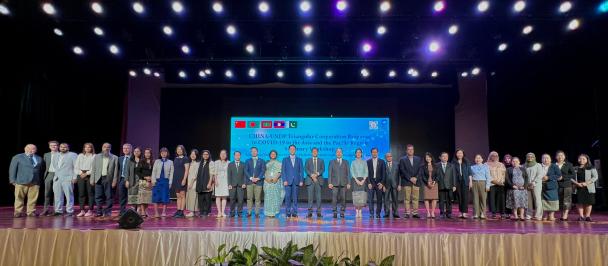There have been more than 1,400 confirmed cases of coronavirus COVID-19 in Iraq, and more than 79 people have died from the disease. UNDP is working with its partners to marshal resources to prepare, respond, and recover as a crisis unparalleled in our lifetime hits a country struggling to recover from years of conflict.
The governments of Belgium, the Netherlands and Sweden have committed US$5 million to support the COVID-19 response. The money will contribute to UNDP Iraq’s initial US$22 million response package, which is being implemented under the umbrella of the Funding Facility for Stabilization.
UNDP’s response includes increasing the testing capacity of laboratories, providing personal protective equipment to healthcare workers, increasing the number of isolation wards, and undertaking assessments to establish post-COVID-19 recovery strategies. Focusing on the most vulnerable communities in Iraq, activities will be rolled out in nine hospitals selected by local authorities in the underserved areas of Anbar, Diyala, Dohuk, Basra, Karbala, Najaf, Ninewa and Salah Al-Din.
Number one priority
“Containing the coronavirus outbreak is now the Government of Iraq’s number one priority, particularly as infection rates rise, putting more pressure on the Iraqi healthcare system outside the major capitals. We’re extremely grateful to Belgium, the Netherlands and Sweden for acting swiftly to commit these funds for prevention activities to stem this crisis,” said UNDP Iraq Resident Representative Zena Ali Ahmad.
UNDP’s Funding Facility for Stabilization has been operating in Iraq since June 2015, helping Iraqis to rebuild critical infrastructure, establish sustainable livelihoods and promote peace after the country’s liberation from ISIL. It has facilitated the return of more than 4.6 million people displaced by the conflict.
“Due to the strict curfews imposed by the Government of Iraq, we’ve had no choice but to temporarily halt the implementation of our stabilization activities. However, by capitalizing on the tried-and-tested processes of our successful stabilization work, we will respond to this unprecedented global health crisis with the speed and agility UNDP Iraq is known for,” she said.
Protecting public spaces
In Anbar province, 11 Local Peace Committees have taken the initiative to protect their communities from the pandemic by sterilizing public spaces.
Twenty-four Local Peace Committees were formed in Anbar, Ninewa, and Salah al-Din, three governorates liberated from ISIL’s occupation in Iraq, as part of a project undertaken by UNDP Iraq’s Integrated Reconciliation Programme and funded by the Danish government.
They were developed to promote community cohesiveness in liberated areas by facilitating dialogue, and mediating and brokering local peace agreements between communities. Due to the pandemic the committees are now using their resources to help protect communities from COVID-19.
Markets, streets, residential areas, schools, government institutions, mosques, and displacement camps in major areas in Anbar are being disinfected by trained response teams in coordination with Anbar’s ministries of Defence, Health and Municipalities.
Managing the outbreak
Established in 2018 by UNDP Iraq, the committees are made up of security officers, local authorities, civil society organizations and tribal sheikhs. Each committee is led by their local mayor, who, since the onset of the pandemic, has been working to instruct the public to adhere to health protection measures, and have shifted the committees’ focus to managing the outbreak.
“We carried out many campaigns, including visits to hospitals and emergency rooms late at night to monitor the readiness of medical personnel to receive urgent cases,” said Habbaniyah district mayor Ali Dawood Suleiman. “We will also monitor prices in the markets in coordination with security agencies to ensure the price of goods does not rise.”
While the Anbar governorate is under curfew, food stores are open to residents during defined time periods. The work of the committees is ensuring that residents can shop for necessities as safely as possible.
In January 2020, UNDP and Kurdistan Human Rights Watch (KHRW), with funding from the German government, trained 60 women in Ninewa how to sew and tailor.
They didn’t know it at the time, but their newly developed skills would play a role in keeping Iraqis safe from the global pandemic.
Disposable face masks
When a pharmaceutical company contracted by the Ninewa Department of Health was asked to produce five million disposable face masks in response to the spread of COVID-19, 30 of the recently trained women were employed to produce them. After briefings on the health standards and nature of the environment required for mask production, they began making thousands of masks every day, despite the curfew in Ninewa.
“I am working on developing myself in the sewing profession and in the future, I would like to create a workplace for sewing or a small factory,” says Nora, who took part in the training.
The organization and facilitation of skills development workshops with Kurdistan Human Rights Watch is part of a project spearheaded by UNDP Iraq under the Social Cohesion Programme, which aims to improve peace and social cohesion in all areas of Iraq.
“Once this pandemic is under control, our stabilization activities will resume. Until then, we will work closely with the Government of Iraq, the World Health Organization and other UN agencies to curb the crisis as best we can,” Ms Ahmad said.

 Locations
Locations




